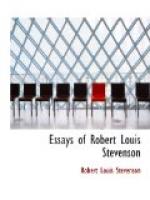One thing in life calls for another; there is a fitness in events and places. The sight of a pleasant arbour[9] puts it in our minds to sit there. One place suggests work, another idleness, a third early rising and long rambles in the dew. The effect of night, of any flowing water, of lighted cities, of the peep of day, of ships, of the open ocean, calls up in the mind an army of anonymous desires and pleasures. Something, we feel, should happen; we know not what, yet we proceed in quest of it. And many of the happiest hours of life fleet by us in this vain attendance on the genius of the place and moment. It is thus that tracts of young fir, and low rocks that reach into deep soundings, particularly torture and delight me. Something must have happened in such places, and perhaps ages back, to members of my race; when I was a child I tried in vain to invent appropriate games for them, as I still try, just as vainly, to fit them with the proper story. Some places speak distinctly. Certain dank gardens cry aloud for a murder; certain old houses demand to be haunted; certain coasts are set apart for ship-wreck. Other spots again seem to abide their destiny, suggestive and impenetrable, “miching mallecho."[10] The inn at Burford Bridge,[11] with its arbours and green garden and silent, eddying river—though it is known already as the place where Keats wrote some of his Endymion and Nelson parted from his Emma—still seems to wait the coming of the appropriate legend. Within these ivied walls, behind these old green shutters, some further business smoulders, waiting for its hour. The old Hawes Inn at the Queen’s Ferry makes a similar call upon my fancy. There it stands, apart from the town, beside the pier, in a climate of its own, half inland, half marine—in front, the ferry bubbling with the tide and the guard-ship swinging to her anchor; behind, the old garden with the trees. Americans seek it already for the sake of Lovel and Oldbuck, who dined there at the beginning of the Antiquary. But you need not tell me—that is not all; there is some story, unrecorded or not yet complete, which must express the meaning of that inn more fully. So it is with names and faces; so it is with incidents




